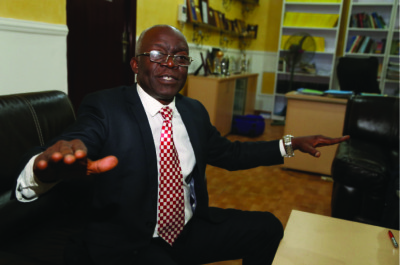BY AMAKIRI WELEKWE
A few months ago, news about the military administering ‘killer vaccine’ on school children spread like wildfire around the country. Parents besieged schools to cart away their children amidst panic and chaos. Alas! It was all false news. By the time the rumors faded, it had left distrust, injuries and death on its path. In the last 12 months alone, false news has been used to bolster hate speech, bigotry and propaganda; we will probably see more in 2018. It is gradually emerging as a strategic weapon for bad civilian and state actors to deepen societal divisions. The consequences can be even direr when part of a well funded covert campaign by a hostile foreign nation.
Welcome to the era of fake news. It’s nothing new though. Before the advent of the Internet, fake news existed in traditional media outlets, especially in tabloid journalism. Today, technology and the Internet have radically transformed mass media and the delivery methods for fake news. So much so that social media feeds, instant messaging and doctored images, audio & videos are now the new vehicle for disinformation.
The Minister of Information and Culture, Alhaji Lai Mohammed has in different fora expressed deep concern over the propagation and impact of fake news in the polity. Nobel laureate Wole Soyinka (who himself was a victim of fake news) also voiced grave concern about the role of fake news and social media in society. I am even more worried.
Fake news isn’t limited to Nigeria though. It is in fact a global epidemic. Since 2016, the usage of the term “fake news” and its impact has become widespread. It is Donald Trump’s favorite phrase and was named word of the year for 2016 and 2017 by Collins Dictionary.
Advertisement
According to Freedom House Freedom on the Net 2017 report, governments in a total of 30 countries deployed some form of manipulation to distort online information in order to inflate their popular support and essentially endorse themselves. This practice played a key role in elections and has become significantly more widespread and technically sophisticated over last few years. A variety of techniques such as fake news websites, paid internet commentators, trolls and social bots are being used to perpetrate fake news. Social bots (fake social media accounts) are programmed to automatically post or tweet a particular message at massive rates in order to shape public opinion or national discuss. These bots make fake news posts appear more popular than they are, thereby making it more likely for people to discover them.
According to researchers at the Oxford Internet Institute, in the run-up to the 2016 US presidential election, fake news was particularly prevalent and spread rapidly via social media bots. Here in Nigeria, politicians and political parties engage social media agents or “vuvuzelas”, paid internet commentators to concoct and syndicate hoaxes and propaganda on social media to shape and sway public opinion to their advantage. We saw this happen in the run-up to the 2015 general elections. As we approach 2019 elections, these social media “vuvuzelas” may likely get more sophisticated in the use of modern propaganda spreading technology.
Tools for producing fake media content, audio, video and document forgery technology are proliferating at an alarming rate. Thanks to a boost from artificial intelligence (AI). Nowadays, cyber crooks can easily make changes to hacked documents before leaking them to the public in order to create a desired outcome. It seems we are at the beginning of the end of reliable information, and soon we’ll have to question everything we see and hear.
Advertisement
Adobe recently unveiled Project Voco, a “Photoshop-for-voice” software that makes it possible to alter an audio recording to contain words and phrases the original speaker never uttered, completely indistinguishable from their real voice. This makes it easier to fool people into thinking others said something they did not.
A Canadian based start-up Lyrebird as well as Google’s DeepMind have developed a similar technology that allows anyone to produce surprisingly realistic-sounding speech with the voice of any individual, again, completely indistinguishable from their real voice. The technology can accurately clone human voices with the right accent and tone. They had in a demo generated speeches in the voices of Donald Trump, Barack Obama, and Hillary Clinton. Furthermore, another technology known as Face2Face developed by a team of university researchers lets you make anyone say just about anything in real time, yes in real time.
This unprecedented surge in voice morphing technology will transform the meaning of truth and evidence as we know it. The potential for it to be used to perpetrate propaganda and disinformation is scary. Many young people out there depend on the social media for their daily source of news; they trust and even re-post information shared by friends in their networks (Whatsapp, Instagram, Facebook, Twitter, etc) without question. What happens when those social media agents and bots leverage those new technologies to automatically produce and disseminate distorted reality in ways that are capable of fooling even the trained ear? Moreover, the fact that the same social media creates “filter bubbles,” and digital echo chamber effect where users see content and posts that agree only with their preexisting biases further exacerbate the spread of fake news.
Just as people have learned photographs can be easily manipulated in the age of Photoshop, they likewise need to get used to the idea that cloning the voice of someone else is now possible.
Advertisement
To effectively confront the challenge of fake news, efforts must be taken to improve digital and media literacy especially among our growing population of young Internet users, encouraging them to fact-check and corroborate information before they hit the share button. Taiwan, who recently launched a new school curriculum to teach children how to identify and combat fake news, is a shining example to emulate. Our democracy and fragile unity may not survive the onslaught of fake news if we fail to roll out a winning strategy to fight it off.
Opinion article written by Amakiri Welekwe
Add a comment






